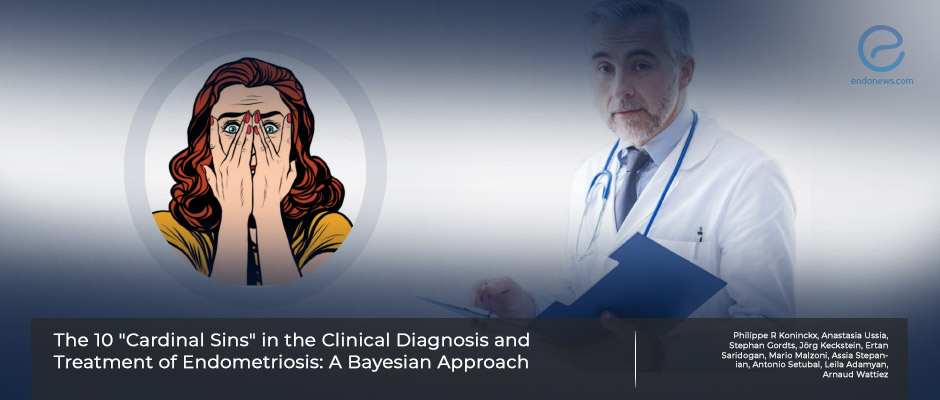The public plea of international group of "endometriosis experts"
Aug 16, 2023
What are the "criticized" points in endometriosis management- the views of the international endometriosis experts
Key Points
Highlights:
- As an overall consensus reached in all medical issues, the diagnosis and treatment of endometriosis should be based on the best clues available.
- An evidence-based medicine underlines avoiding allocation, patient or observer bias, and (traditional) statistical validation.
- However, evidence-based medicine has not still fully recognized the limitations of frequentist or traditional statistics.
Importance:
- An evidence-based diagnosis and treatment are troublesome in endometriosis patients since exact evidence is poorly available.
- Often the diagnosis of endometriosis is restricted to symptomatic women without reliable non-invasive diagnoses.
- In addition, the absence of an appropriate animal model prevents experimentation, and epidemiology is poorly understood.
What's done here:
- The cumulative experiences of doctors who serve at referral centers for women with endometriosis yielding over 50,000 endometriosis treatments were analyzed.
- This analysis was also sent to a group of younger surgeons at Latifa Hospital and to the Winner’s groups, asking for indications of their agreement or disagreement.
- The number of mistakes to avoid was limited to 10 items in order to yield the most important points of concern.
Key Results:
- Recognizing the heterogeneity of endometriosis lesions is important to understand the variable response to medical therapy and the need for follow-up during treatment.
- The lower detection limit and the positive predictive value of imaging outside referral centers should be recognized.
- Many problems result from sub-specialization, misunderstanding of evidence-based medicine, and the absence of surgical quality control.
- The dilemma of “what we don’t know, we fear” explains the different perceptions of many aspects, including surgery complications in endometriosis.
Lay Summary
A group of international “endometriosis experts” led by Professor Philippe R. Koninckx from Belgium, have published their unique scientific paper “The 10 “Cardinal Sins” in the Clinical Diagnosis and Treatment of Endometriosis: A Bayesian Approach” in a recent issue of Journal of Clinical Medicine.
As accepted in all clinical issues, the diagnosis and treatment of endometriosis should be based on the best clues available and evidence-based medicine emphasizes avoiding allocation, patient or observer bias, and (traditional) statistical validation. Evidence-based medicine has not yet fully recognized the limitations of frequentist or traditional statistics and is especially troublesome in endometriosis patients since exact evidence is poorly available.
Clinical diagnosis of endometriosis is mainly restricted to symptomatic women without reliable non-invasive diagnoses as well as the absence of an appropriate animal model prevents experimentation and epidemiology is poorly understood. The cumulative experiences of an international group of experts serving at referral centers for women with endometriosis yielding over 50,000 endometriosis treatments were analyzed. This cumulative analysis was sent to a group of younger surgeons at Latifa Hospital and to the Winner’s groups, asking for indications of their agreement or disagreement. As a final consensus, the number of mistakes to avoid was limited to 10 items in order to yield the most important points of concern.
Endometriosis should not be any longer understood simply as "endometrium-like tissue implanted outside the uterus" since the lesions are clonal and macroscopically and biochemically different with different aromatase activity and progesterone resistance. The imaging accuracy (either ultrasound or MRI) cannot distinguish reliably between cystic ovarian endometriosis and a cystic corpus luteum, therefore, surgery should be postponed when imaging and clinical signs such as an acute onset of pain or a mobile cystic ovary could suggest a cystic corpus luteum or other non-concerning cystic pathology.
In women with severe pain and clinical suspicion of deep endometriosis, a diagnostic laparoscopy and surgery should be carried out by experts familiar with infertility and endometriosis surgery.
Reliable experience is suggestive of avoiding repetitive IVF treatment in women with rectovaginal deep endometriosis nodules since repetitive oocyte pickup through a nodule frequently results in complicated surgery later on.
The discussion by these international experts on mistakes made in endometriosis presents an understanding of the pathophysiology, the interpretation of diagnostic tests, the limitations of evidence-based medicine, the need for sub-disciplines besides quality control in surgery.
Research Source: https://pubmed.ncbi.nlm.nih.gov/37445589/
endometriosis international experts evidence-based medicine endometriosis surgery

